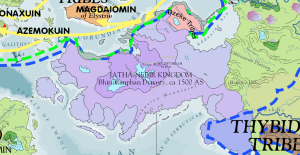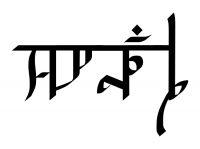Difference between revisions of "Jatha-Nebir Kingdom"
Trismegistus (talk | contribs) m |
Trismegistus (talk | contribs) m |
||
| (7 intermediate revisions by the same user not shown) | |||
| Line 3: | Line 3: | ||
[[File:Map_Kalama_ca1500AS_01.png|thumb|300px|The extent of the Jatha-Nebir Kingdom under the rule of the [[Bhirukamphan Dynasty]] of roughly the mid second millennium before [[Salmakhamer]]. World of Asdar Screen Capture, ©2024, All Rights Reserved.]] | [[File:Map_Kalama_ca1500AS_01.png|thumb|300px|The extent of the Jatha-Nebir Kingdom under the rule of the [[Bhirukamphan Dynasty]] of roughly the mid second millennium before [[Salmakhamer]]. World of Asdar Screen Capture, ©2024, All Rights Reserved.]] | ||
| − | The last of eleven Kingdoms of Kalama stretching from the [[Flood of Aturyanda]] to the Midrinksi Conquest, the Jatha-Nebir Kingdom lasted from 1729 AS to 1117 AS, a little more than six centuries. Although the last, scholars deem that it was not the weakest and that it endured despite the continual influx of Midrinksi clans into the Corundian Peninsula. The rulers of the Jatha-Nebir Kingdom are divided into seven successive dynasties. Their common seat of residence was ancient Johaulia, then called [[Jhukhaulya]]. | + | The last of eleven Kingdoms of Kalama stretching from the [[Flood of Aturyanda]] to the Midrinksi Conquest, the Jatha-Nebir Kingdom lasted from 1729 AS to 1117 AS, a little more than six centuries. Despite the instability of the late Tamukh Kingdom and the subsequent Kalaman Interregnal Period, the defeat of the Neptultchi Pirates, ca 1900 AS, created a stable foundation for another great Kalaman Kingdom. The Jatha-Nebir Kingdom arose from the various independent rulers of the [[Kalaman Interregnal Period]], 1884 to 1729 [[AS]], (~155 years long). The Jatha-Nebir Kingdom ruled over an empire consisting of the central 'High Kingdom' on the Vimalian Plateau and on what is today Rhiony and of various vassal princedoms of Kalama and Trans-Thybdis (The east coast of the Memnosian Sea, north of Yephalah). Although the last of the eleven, scholars deem that it was not the weakest and that it endured despite the continual influx of Midrinksi clans into the Corundian Peninsula, the settlement of Ithatian Tribes on the northern coasts of Kalama, the invasion of the southern stretches of the empire by Thybidite Tribes, and ongoing internal struggles and dynastic conflicts. The various migrations of the second millennium which challenged the stability and continuity of the Jatha-Nebir Kingdom are known as the The rulers of the Jatha-Nebir Kingdom are divided into seven successive dynasties. Their common seat of residence was ancient Johaulia, then called [[Jhukhaulya]]. By the end of the second millennium before Salmakhamer, continued wars with the Midrinksi Tribes to the east brought about the end of the Zhalayara Kuswa Dynasty and the collapse of the imperial system of vassalage. With eastern Kalama under the occupation of the Midrinksi Tribes, the remaining lands reverted to local rule. |
[[File:HirgunyaScriptJhukhaulya.png|thumb|200px|The name of the city Jhukhaulya in Hirgunya Script]] | [[File:HirgunyaScriptJhukhaulya.png|thumb|200px|The name of the city Jhukhaulya in Hirgunya Script]] | ||
| + | =Chronology of the Jatha-Nebir Kingdom= | ||
*(Last Kingdom) | *(Last Kingdom) | ||
[[File:HirgunyaScriptJatha-Nebir.png|thumb|200px|Hirgunya Script, "Jatha-Nebir"]] | [[File:HirgunyaScriptJatha-Nebir.png|thumb|200px|Hirgunya Script, "Jatha-Nebir"]] | ||
| Line 41: | Line 42: | ||
*Ambhiru II, 1151 to 1117, ~34 yrs | *Ambhiru II, 1151 to 1117, ~34 yrs | ||
| + | =Kingdoms and Rulers Contemporary with the Jatha-Nebir Kingdom= | ||
| + | *Narshad: Ruled by Pallathantic and Ithatian dynasties | ||
| + | *City-State of Elántuventh in Shelekhumbia | ||
=See Also= | =See Also= | ||
Latest revision as of 20:44, 26 August 2024

The last of eleven Kingdoms of Kalama stretching from the Flood of Aturyanda to the Midrinksi Conquest, the Jatha-Nebir Kingdom lasted from 1729 AS to 1117 AS, a little more than six centuries. Despite the instability of the late Tamukh Kingdom and the subsequent Kalaman Interregnal Period, the defeat of the Neptultchi Pirates, ca 1900 AS, created a stable foundation for another great Kalaman Kingdom. The Jatha-Nebir Kingdom arose from the various independent rulers of the Kalaman Interregnal Period, 1884 to 1729 AS, (~155 years long). The Jatha-Nebir Kingdom ruled over an empire consisting of the central 'High Kingdom' on the Vimalian Plateau and on what is today Rhiony and of various vassal princedoms of Kalama and Trans-Thybdis (The east coast of the Memnosian Sea, north of Yephalah). Although the last of the eleven, scholars deem that it was not the weakest and that it endured despite the continual influx of Midrinksi clans into the Corundian Peninsula, the settlement of Ithatian Tribes on the northern coasts of Kalama, the invasion of the southern stretches of the empire by Thybidite Tribes, and ongoing internal struggles and dynastic conflicts. The various migrations of the second millennium which challenged the stability and continuity of the Jatha-Nebir Kingdom are known as the The rulers of the Jatha-Nebir Kingdom are divided into seven successive dynasties. Their common seat of residence was ancient Johaulia, then called Jhukhaulya. By the end of the second millennium before Salmakhamer, continued wars with the Midrinksi Tribes to the east brought about the end of the Zhalayara Kuswa Dynasty and the collapse of the imperial system of vassalage. With eastern Kalama under the occupation of the Midrinksi Tribes, the remaining lands reverted to local rule.
Chronology of the Jatha-Nebir Kingdom
- (Last Kingdom)
- 1729 AS to 1117 AS, (~612 years)
- Non-indigenous to Kshandiguha, rulers come from Jakubya (Lucacia)
- during this time is thought the Kalaman Elephant became extinct.
- The palace was moved back to Jhukhaulya.
- Therya-Prakrip Dynasty, 1729 AS to 1632 AS, (~97 years)
- Ummattha Dynasty, 1631 to 1578 AS, ~54 yrs
- Bhirukamphan Dynasty, 1577 AS to 1405 AS, ~173 yrs
- Karyigha Thaulyagna Dynasty, 1404 AS to 1354 AS, 51 yrs
- Phalumicchurn Dynasty, 1353 AS to 1267 AS, ~87 yrs
- Addhya-Challa Dynasty, 1266 AS to 1164 AS, ~103 yrs
- Phankala
- Chalmudhra
- Zhalayara Kuswa Dynasty, 1163 AS to 1117 AS, ~47 yrs
last rulers pre-Midrinksi rulers of all Kalama, Jatha-Nebirite rulers retained in high valleys of Vimal
Midrinksi invasions (or settlements, depending upon your historical viewpoint) weaken the Zhalayara Kuswa Dynasty which collapses amid internecine conflicts among potential claimants to the throne of the Great Kingship. None is successful and historians regard this as the end of the Jatha-Nebir Kingdom.
- Ambhiru, 1163 to 1151, ~12 yrs
- Ambhiru II, 1151 to 1117, ~34 yrs
Kingdoms and Rulers Contemporary with the Jatha-Nebir Kingdom
- Narshad: Ruled by Pallathantic and Ithatian dynasties
- City-State of Elántuventh in Shelekhumbia
See Also
| This article is a stub. It requires further development by the creator. |

